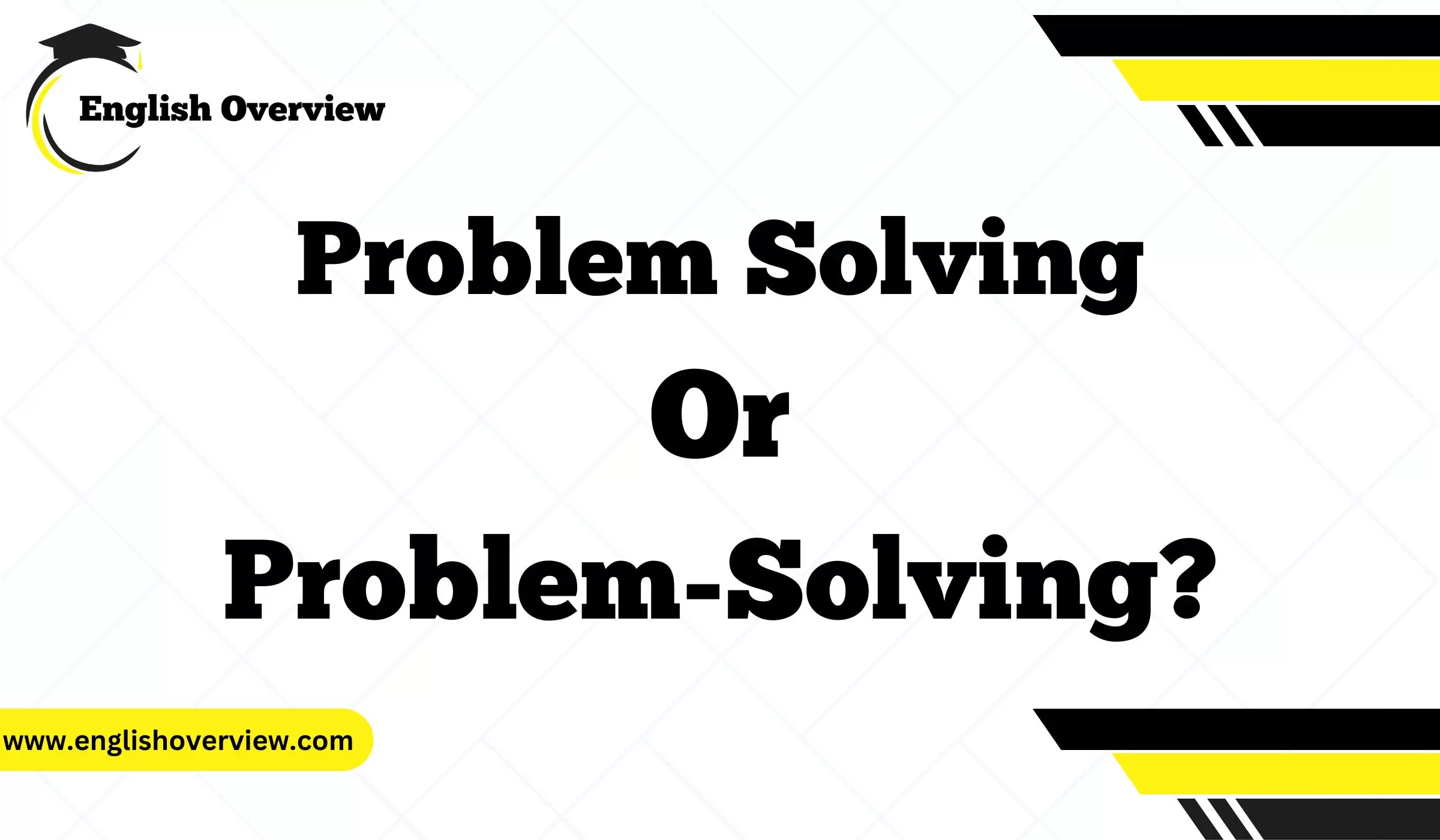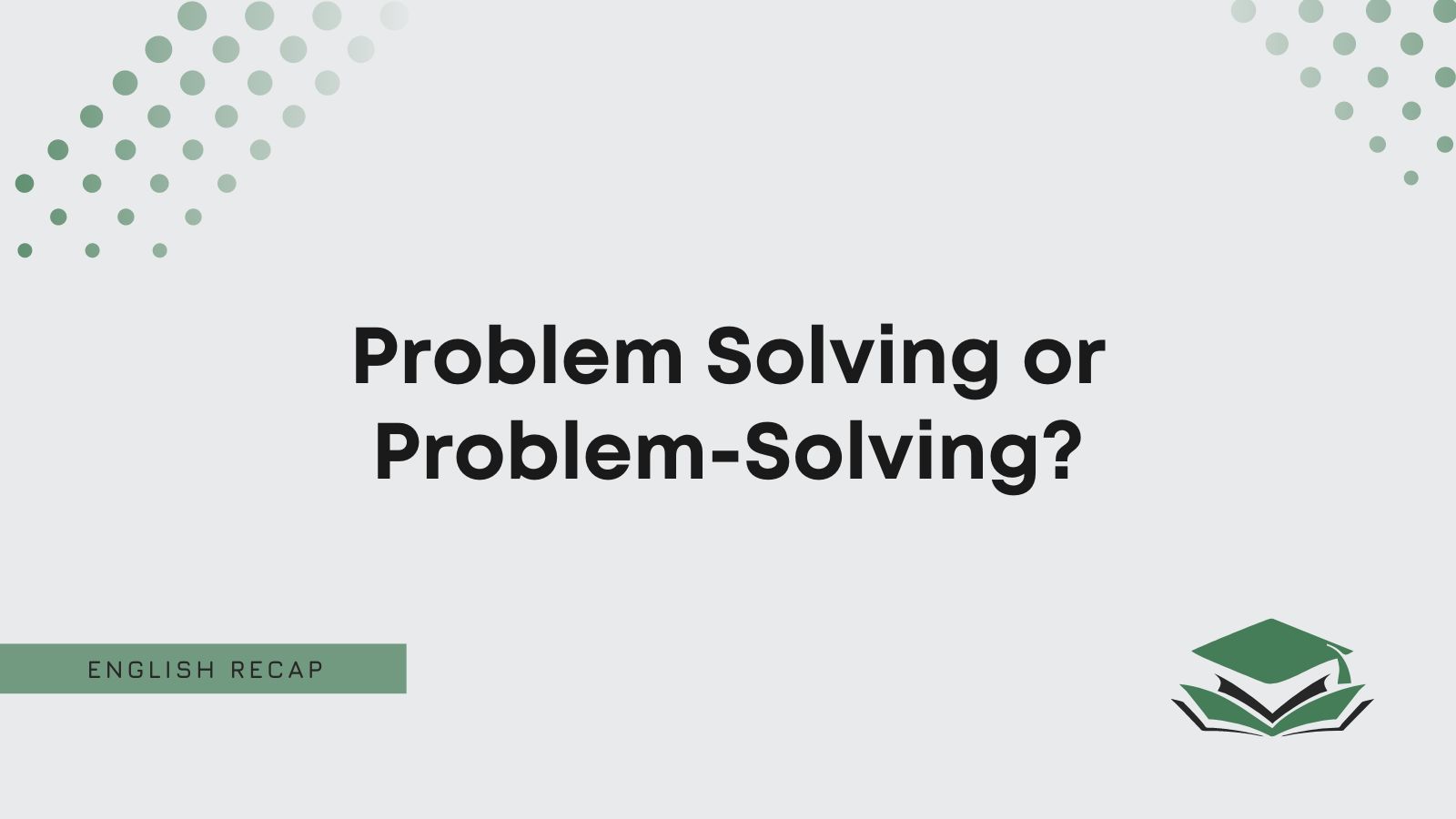

Problem Solving or Problem-Solving?
The term “Problem-Solving” or “Problem Solving” often takes center stage in discussions about overcoming challenges. However, the nuances in its usage can be perplexing. This exploration aims to dissect the word, observing its forms as a noun, adjective, and verb. Through five examples for each category, we’ll emphasize correct spelling and punctuation, while delving into the importance of adhering to grammar rules.
The focal point will be the distinction between “Problem Solving” as a verb phrase, “Problem-Solving” as a hyphenated adjective or noun, and the incorrect form “Problem Solving.” Furthermore, we’ll highlight the consistency in usage between UK and US English.
The Noun Form: Problem-Solving
Correct examples.
- Effective problem-solving requires a systematic approach.
- The team showcased remarkable problem-solving skills during the crisis.
- Our workshop focused on collaborative problem-solving techniques.
- She excelled in the art of creative problem-solving .
- The conference highlighted the importance of collective problem-solving efforts.
Incorrect Examples
- Effective problem solving requires a systematic approach.
- The team showcased remarkable problem solving skills during the crisis.
- Our workshop focused on collaborative problem solving techniques.
- She excelled in the art of creative problem solving .
- The conference highlighted the importance of collective problem solving efforts.
Note: The correct noun form is “problem-solving” with a hyphen.
The Adjective Form: Problem-Solving
- The problem-solving approach proved successful in the project.
- Her problem-solving mindset made her an asset to the team.
- A problem-solving mindset is crucial for navigating challenges.
- The group showcased effective problem-solving techniques.
- They developed innovative problem-solving strategies.
- The problem solving approach proved successful in the project.
- Her problem solving mindset made her an asset to the team.
- A problem solving mindset is crucial for navigating challenges.
- The group showcased effective problem solving techniques.
- They developed innovative problem solving strategies.
Note: When used as an adjective, “problem-solving” should be hyphenated.
Read More: In Person or In-Person?
The Verb Form: Problem Solving
- The team collectively worked on problem solving for the project.
- She excels in problem solving by breaking down complex issues.
- They actively engage in collaborative problem solving .
- The committee is dedicated to effective problem solving .
- The approach involves strategic problem solving .
- The team collectively worked on problem-solving for the project.
- She excels in problem-solving by breaking down complex issues.
- They actively engage in collaborative problem-solving .
- The committee is dedicated to effective problem-solving .
- The approach involves strategic problem-solving .
Note: The correct verb form is “problem solving” without a hyphen.
Importance of Grammar Rules
Adhering to grammar rules is paramount for effective communication. Consistency in the use of hyphens, especially in words like “problem-solving,” ensures clarity and maintains the intended meaning. Proper grammar also contributes to professionalism in written and spoken communication.
Consistency in UK and US English
The usage of “problem-solving” remains consistent between UK and US English. Regardless of geographical location, the hyphenated form is universally accepted and preferred.
In conclusion, understanding the nuances of “Problem-Solving” versus “Problem Solving” is vital for clear and effective communication. The correct usage varies depending on whether it functions as a noun, adjective, or verb. Adhering to grammar rules, including the proper placement of hyphens, enhances the precision of language.
The consistency in usage across UK and US English simplifies the application of these rules globally. So, whether discussing strategies, approaches, or mindsets, the choice between hyphenation and separation holds significance in conveying the right message.

Dariel Campbell is currently an English instructor at a university. She has experience in teaching and assessing English tests including TOEFL, IELTS, BULATS, FCE, CAE, and PTEG . With over a decade of teaching expertise, Dariel Campbell utilizes his knowledge to develop English lessons for her audience on English Overview.
Leave a Comment Cancel reply
You must be logged in to post a comment.
Welcome to The English Overview, where we help to improve your language skills. Explore lessons on words, sentences, punctuation, and more. Enhance your English fluency and easily create powerful expressions. Come along on a journey to become excellent in language.
Privacy Policy
Latest Articles

Tips for maintaining an Indoor Smart Bike
November 20, 2024

ZBike FREE and ZDrive MAX, the latest in the world of professional indoor cycling – Nameshype.com

How Emotion Can Affect Your Personal Finances
© 2024 English Overview
Definition of 'problem-solving'
Problem-solving in british english.

Examples of 'problem-solving' in a sentence problem-solving
Trends of problem-solving
View usage for: All Years Last 10 years Last 50 years Last 100 years Last 300 years

Browse alphabetically problem-solving
- problem stems
- problem was diagnosed
- problem-free
- problem-solving
- problematic
- problematic relationship
- problematic situation
- All ENGLISH words that begin with 'P'
Wordle Helper

Scrabble Tools
Quick word challenge
Quiz Review
Score: 0 / 5

- Access the entire site, including the Easy Learning Grammar , and our language quizzes.
- Customize your language settings. (Unregistered users can only access the International English interface for some pages.)
- Submit new words and phrases to the dictionary.
- Benefit from an increased character limit in our Translator tool.
- Receive our weekly newsletter with the latest news, exclusive content, and offers.
- Be the first to enjoy new tools and features.
- It is easy and completely free !

Problem Solving or Problem-Solving?

The term problem-solving with a hyphen is an adjective that describes nouns in a sentence. E.g., “The problem-solving abilities of this program are excellent.” Furthermore, the term problem solving without a hyphen is a noun. E.g., “He is excellent at problem solving.”
The term problem solving can appear as two different word types, a noun or a compound adjective.
When problem-solving has a hyphen, it is an adjective describing a noun .
For example, in this sentence, problem-solving describes capabilities , which is a noun. Therefore, you need to include a hyphen.
- Her problem-solving capabilities are outstanding.
However, when you use problem solving as a noun , the term is usually not hyphenated because it doesn’t modify anything.
- She is an expert at all types of problem solving .
Furthermore, the rule of using a hyphen for the adjective but not for the noun is correct grammar according to AP Style and the Chicago Manual of Style .
Sometimes in English, the rules concerning punctuation, such as hyphens, are vague. For example, in the Cambridge and Oxford dictionaries, the noun problem-solving appears with a hyphen.
Essentially, you should always use a hyphen for the term problem-solving as an adjective. However, for problem solving as a noun, unless you follow a specific style guide like AP that does not use a hyphen, you can choose whether to hyphenate the noun. Just make sure that you are consistent with your choice.
In addition, Google Ngram shows that problem solving without a hyphen is slightly more popular in the US than with a hyphen. However, in the UK , the hyphenated version is slightly more frequent.
Now that you have learned the basics concerning the term problem solving, please keep reading the rest of the article to learn more about using the two variations of problem solving .
Problem Solving
The term problem solving as two words without a hyphen is the noun form.
In terms of use, it relates to resolving problems, which can relate to problems in a specific discipline or more general problems.
In the following examples, the term problem solving refers to the act of solving problems. Therefore, we do not need a hyphen.
- Her inability to perform problem solving on any task means that she loses her temper quickly.
- You should include problem solving as a skill on your resume.
- In team projects, effective problem solving can lead to innovative solutions and successful outcomes.
- Problem solving is not just about finding immediate answers but understanding the root cause of the issue.
- Her approach to problem solving often involves breaking down complex tasks into manageable steps.
Furthermore, you should use the above rule when following both AP Style or the Chicago Manual of Style.
Problem-Solving
The term problem-solving as one word with a hyphen is a compound word that appears before a noun. Hence, it modifies the noun .
For example, in the following sentence, the word problem-solving modifies the noun skills.
- His problem-solving skills are the best in the company.
- Her problem-solving approach is both methodical and creative, making her a valuable asset to the team.
- The workshop focuses on problem-solving techniques to address everyday challenges.
- Many employers prioritize candidates with strong problem-solving abilities in dynamic work environments.
- The game challenges children to use their problem-solving instincts to navigate various puzzles.
Furthermore, you will come across some sentences in which the noun problem solving has a hyphen.
As shown in these examples:
- You need to work on your problem-solving if you want to become an engineer.
- Improving your problem-solving is essential for success in mathematics.
- Mastering problem-solving will greatly benefit you in software development.
This is often a stylistic choice . However, in writing that follows AP Style , you should not use a hyphen with the noun form of problem solving.
Problemsolving
The word problemsolving as a single word with no hyphen or space is incorrect , and you shouldn’t use it in this format.
There are two ways you can use the term problem solving .
The first is as a noun, in which case there is no hyphen, but there is a space.
- Correct: He is excellent at problem solving because he never gives up. (noun)
- Incorrect: He is excellent at problemsolving because he never gives up. (noun)
- Correct : She has a knack for problem solving , especially in high-pressure situations. (noun)
- Incorrect : She has a knack for problemsolving , especially in high-pressure situations. (noun)
Also, you can write problem-solving as an adjective, in which case you need a hyphen.
- Correct: He is excellent at problem solving because he never gives up. (adjective)
- Incorrect: He is excellent at problemsolving because he never gives up. (adjective)
- Correct : They often turn to her for advice on problem solving in challenging situations. (adjective)
- Incorrect : They often turn to her for advice on problemsolving in challenging situations. (adjective)
That’s all you need to know about the grammar rules concerning the words problem solving , problem-solving , and problemsolving . Rest assured that your sentences will be correct if you follow these!
- Half Day or Half-Day?
- Well Deserved or Well-Deserved?
- Well Written or Well-Written?
- World Class or World-Class?
We are a team of dedicated English teachers.
Our mission is to help you create a professional impression toward colleagues, clients, and executives.
© EnglishRecap
Words and phrases
Personal account.
- Access or purchase personal subscriptions
- Get our newsletter
- Save searches
- Set display preferences
Institutional access
Sign in with library card
Sign in with username / password
Recommend to your librarian
Institutional account management
Sign in as administrator on Oxford Academic
problem-solve verb
- Hide all quotations
What does the verb problem-solve mean?
There is one meaning in OED's entry for the verb problem-solve . See ‘Meaning & use’ for definition, usage, and quotation evidence.
How common is the verb problem-solve ?
How is the verb problem-solve pronounced, british english, u.s. english, where does the verb problem-solve come from.
Earliest known use
The earliest known use of the verb problem-solve is in the 1950s.
OED's earliest evidence for problem-solve is from 1956, in New York Times .
problem-solve is formed within English, by compounding.
Etymons: problem n. , solve v.
Nearby entries
- probleming, n. 1657–
- problemist, n. a1631–
- problemistic, adj. 1892–
- problemize, v. 1844–
- problemless, adj. 1865–
- problemo, n. 1985–
- problem of three bodies, n. 1814–
- problem-orientated, adj. 1951–
- problem-oriented, adj. 1946–
- problem play, n. 1894–
- problem-solve, v. 1956–
- problem-solver, n. 1848–
- problem-solving, n. & adj. 1854–
- problem tape, n. 1948–
- problem-wise, adv. a1859–
- pro-Boarder, n. 1902–
- pro-Boerism, n. 1899–
- probole, n.¹ 1684–1880
- probole, n.² 1696–
- probolistic, adj. 1876–
- pro bono, adv. & adj. 1774–
Thank you for visiting Oxford English Dictionary
To continue reading, please sign in below or purchase a subscription. After purchasing, please sign in below to access the content.
Meaning & use
Pronunciation, entry history for problem-solve, v..
problem-solve, v. was first published in December 2004.
problem-solve, v. was last modified in July 2023.
oed.com is a living text, updated every three months. Modifications may include:
- further revisions to definitions, pronunciation, etymology, headwords, variant spellings, quotations, and dates;
- new senses, phrases, and quotations.
Revisions and additions of this kind were last incorporated into problem-solve, v. in July 2023.
Please submit your feedback for problem-solve, v.
Please include your email address if you are happy to be contacted about your feedback. OUP will not use this email address for any other purpose.
Citation details
Factsheet for problem-solve, v., browse entry.
